How To Get Rid Of Japanese Beetles On Roses: Control & Prevent This Destructive Pest
Are Japanese beetles ravaging your roses? Take swift action with our expert guide to managing infestations – plus long-term measures to prevent their return.
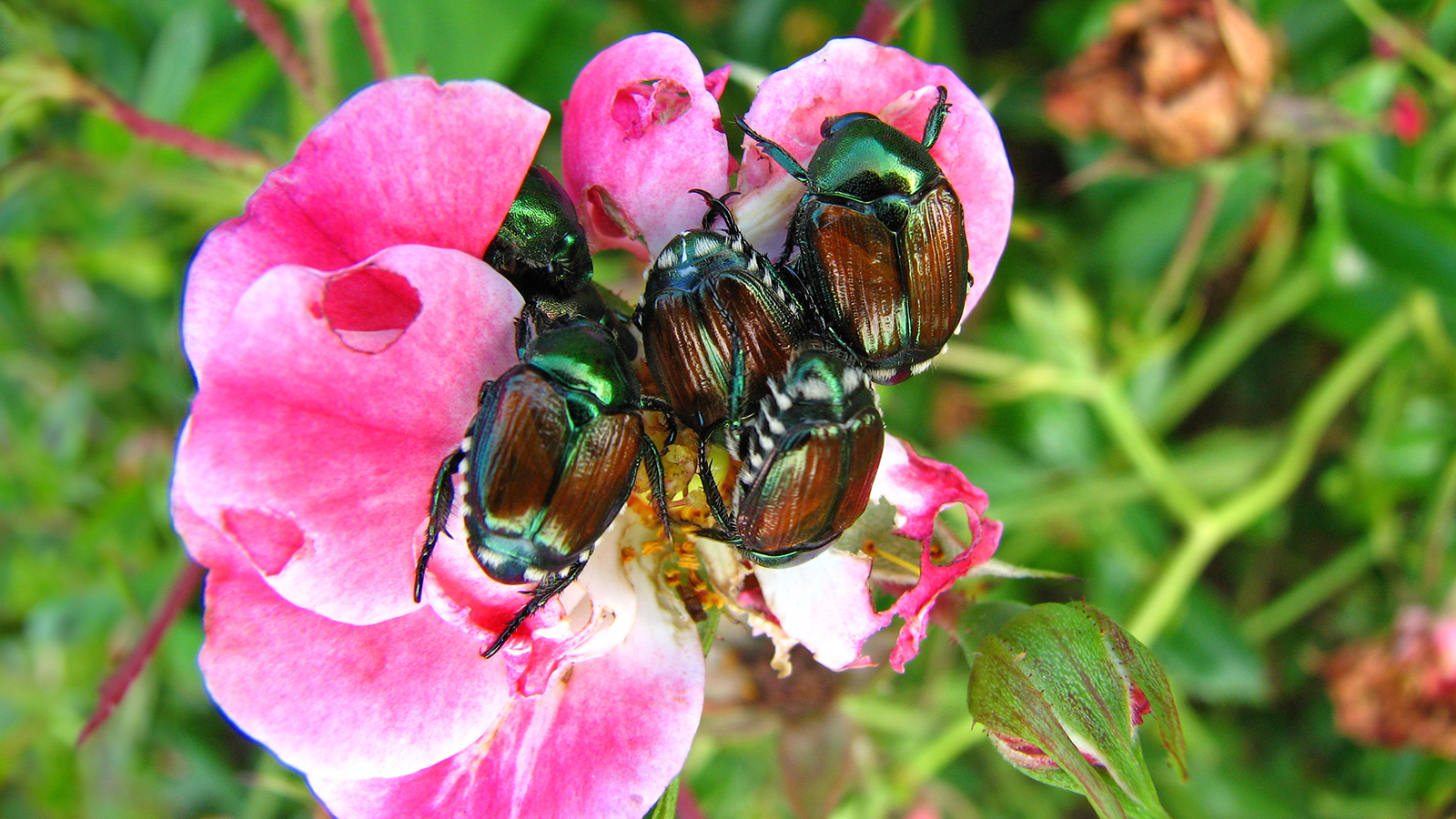
- How to Tell if Japanese Beetles Are Attacking Your Roses
- Can Japanese Beetles Destroy Roses?
- Best Ways to Get Rid of Japanese Beetles on Roses
- Hand-Picking
- Cover Shrubs with Mesh
- Skip the Traps (Mostly)
- Use Milky Spore for Grub Control
- Use Insecticidal Sprays – With Care
- Plants to Prevent Japanese Beetles
- Trap Crops and Companion Plants
- Choose Resistant Roses
- Will Soapy Water Keep Japanese Beetles Off Roses?
For rose growers, few things are more disheartening than discovering Japanese beetles on roses. These iridescent, copper-colored pests aren’t just unsightly – they’re relentless, capable of skeletonizing leaves, devouring flower petals, and turning beautiful rose beds into a field of tears seemingly overnight.
If you’ve noticed Japanese beetles eating roses in your garden, it’s time to act fast. These garden bullies are attracted to roses due to their appealing fragrance, color, and sun exposure. This guide walks you through the process of identifying, managing, and ultimately keeping these pests off your roses for good.
If you’re dealing with multiple threats in your rose garden, it’s also worth brushing up on other common rose pests that can appear throughout the season. And if you’re just starting out or planning a new rose bed, don’t miss this helpful guide on how to grow roses for long-term success.
How to Tell if Japanese Beetles Are Attacking Your Roses
Identifying Japanese beetles is relatively simple. Their metallic green bodies with bronze wings are hard to miss. You may first notice the pest in its larval stage in spring. White grubs, present in the soil, are among the first indicators that beetles may become problematic.
Adult beetles emerge in early summer, and that’s when the real damage begins, as they begin feeding on host plants over the course of several weeks. They typically feed during the day, chewing large holes in leaves or completely skeletonizing them. You might also find them clustering on rosebuds or flower petals. While roses are a favorite, Japanese beetles will happily sample a buffet of other plants if given the chance. Other favorite plants include Japanese maple trees, hollyhocks, and grapevines.
Once the beetles have finished feeding, they will lay their eggs, completing their life cycle and setting the stage for the next generation to attack your plants.
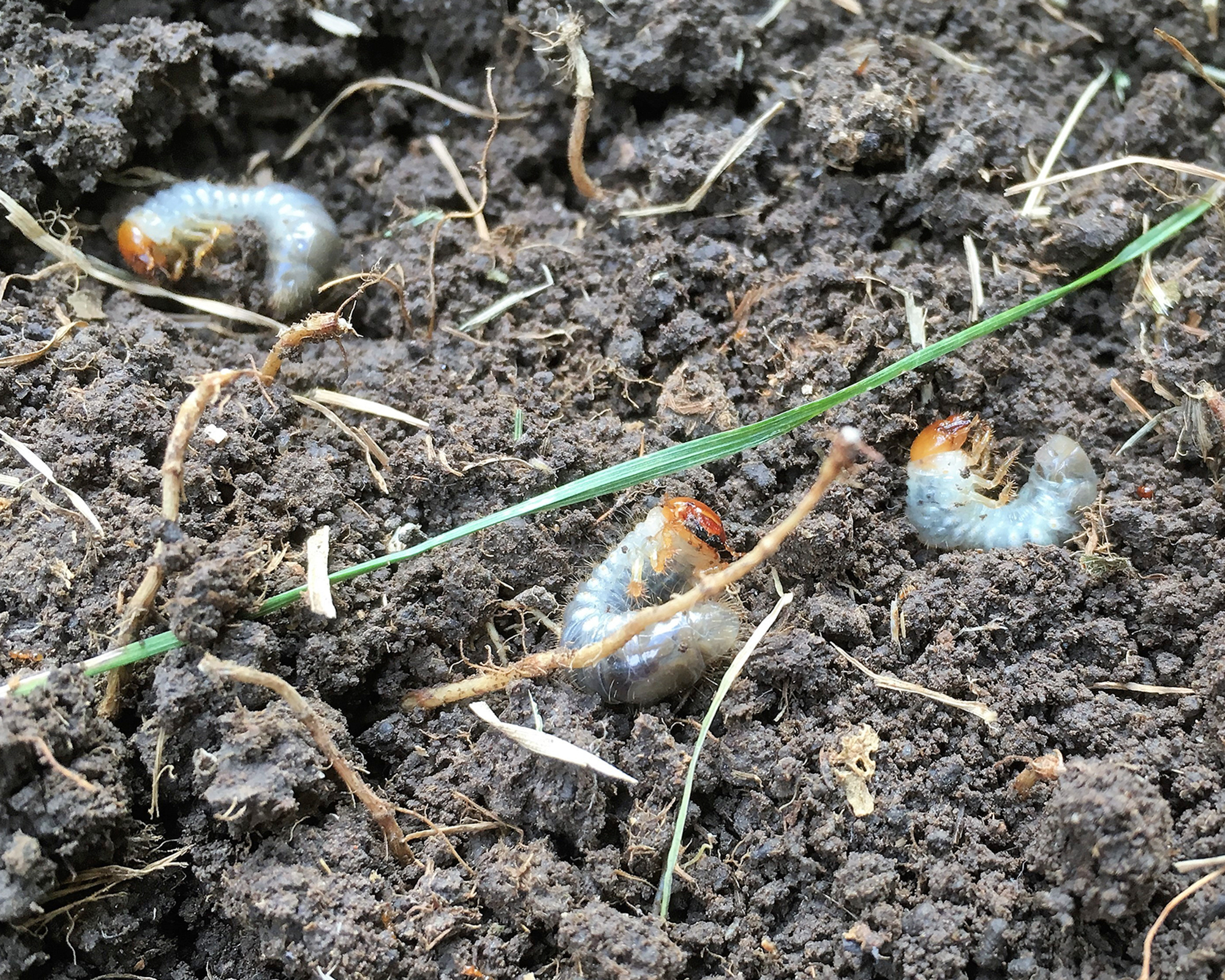
Can Japanese Beetles Destroy Roses?
Though it is highly unlikely that damage caused by beetles will lead to the loss of plants, excessive feeding by the insect can be devastating to the plant’s overall appearance and vigor. A heavy infestation can quickly defoliate entire shrubs, stress the plant, and stunt flower development. Fortunately, roses are hardy and should recover quickly, resuming growth once beetle season has passed.
Sign up for the Gardening Know How newsletter today and receive a free copy of our e-book "How to Grow Delicious Tomatoes".
Still, that doesn’t mean you should wait it out. The sooner you intervene, the better your plants will look and perform – both now and in future growing seasons.
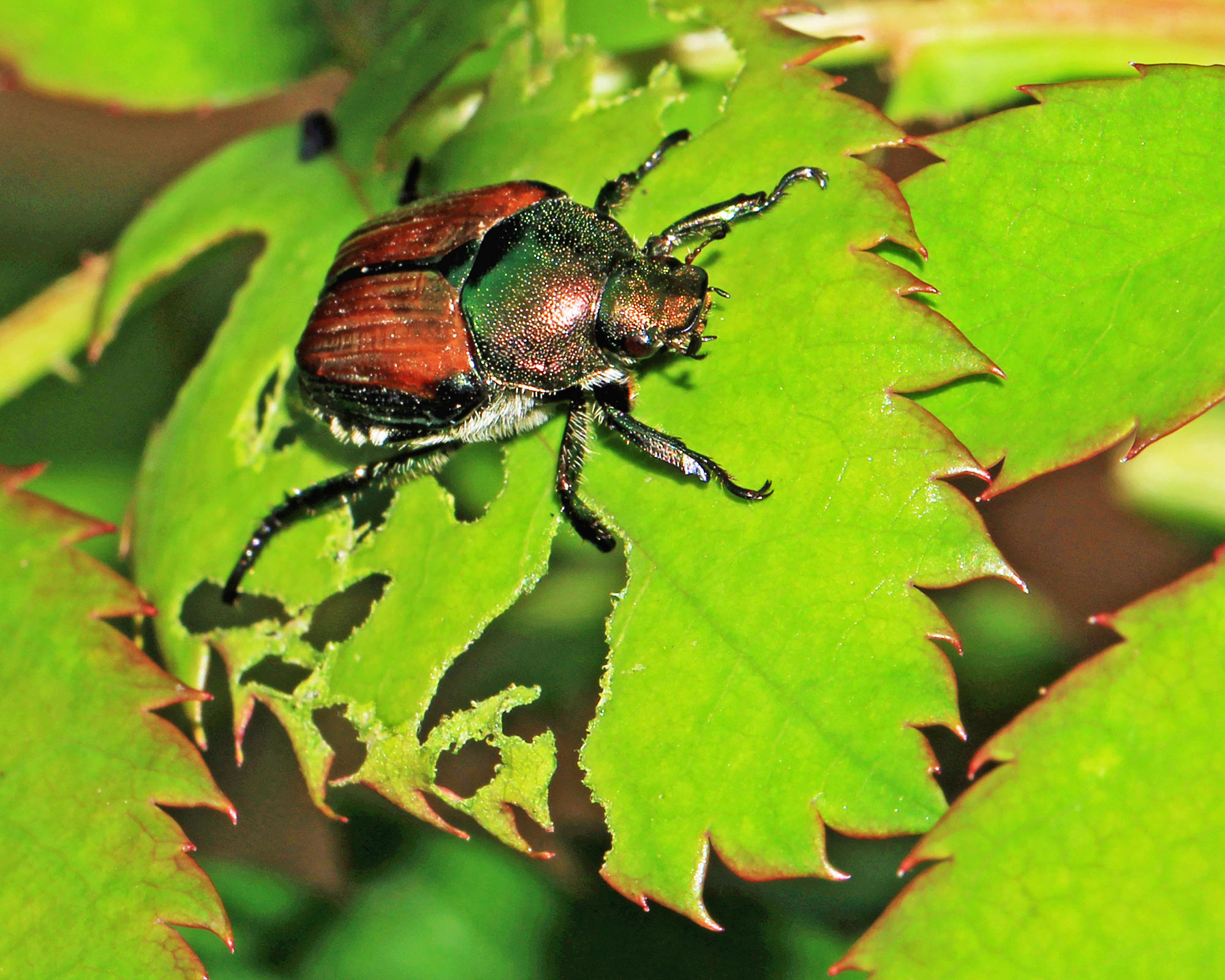
Best Ways to Get Rid of Japanese Beetles on Roses
Controlling Japanese beetles and roses can be difficult and is best done with a multi-pronged approach. Frequent monitoring in early summer is key. Here are the most effective options when dealing with an active infestation:
Hand-Picking
One of the simplest – and surprisingly effective – methods is to hand-pick beetles and drop them into a bucket of water. Early in the morning, when they’re sluggish, you can shake the branches over the bucket, and they should drop off. It may not be glamorous, but it works.
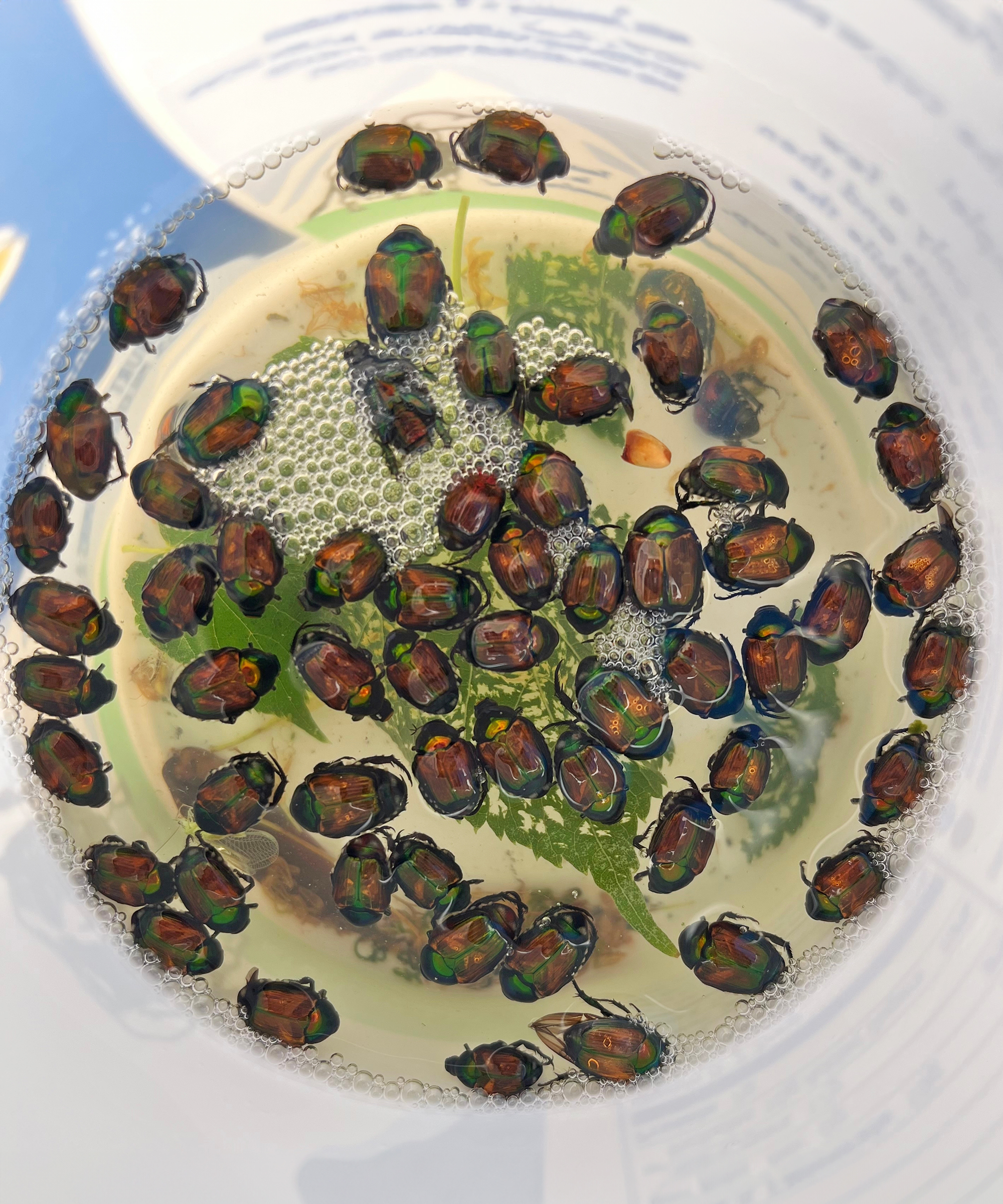
Cover Shrubs with Mesh
During the peak of beetle activity, try covering roses with a tight woven mesh netting or cheesecloth. The netting acts as a physical barrier, preventing beetles from accessing the plants. To be effective, the mesh should have openings smaller than one-quarter inch.
Skip the Traps (Mostly)
While beetle traps are often recommended, research shows they can backfire. A study from the University of Kentucky found the traps tend to attract more beetles than they catch, leading to even more damage, especially to plants nearby. If you still want to try traps, place them well away from your roses – ideally at the far edge of your property.
Use Milky Spore for Grub Control
An old but proven method, milky spore targets beetle grubs in the soil. The grubs eat the spore and ingest a bacterium that kills them. Upon killing the grubs, even more of the milky spore is generated, thus helping to kill even more grubs. This method can take three to four years to spread enough through the garden areas, depending upon the size of the garden, to make the impact desired. You can buy Milky Spore from Amazon.
If going this route, it is extremely important to use an insecticide to kill the adult beetles that won't also kill the grubs, as this slows the spread of the milky spore and, thus, can negate its impact upon the beetles you are trying to gain control over.
Use Insecticidal Sprays – With Care
Spraying and killing the adult beetles prior to them laying their eggs to start the cycle all over again is of great importance as well. Recommended products include Sevin, Merit, and Safer BioNeem, which can all be purchased through Amazon. However, be careful to keep the spray application high to mid-range of the bush and not directly on the ground or base of the bush. Move quickly with the spraying so as not to get a lot of overspray or dripping onto the ground below.
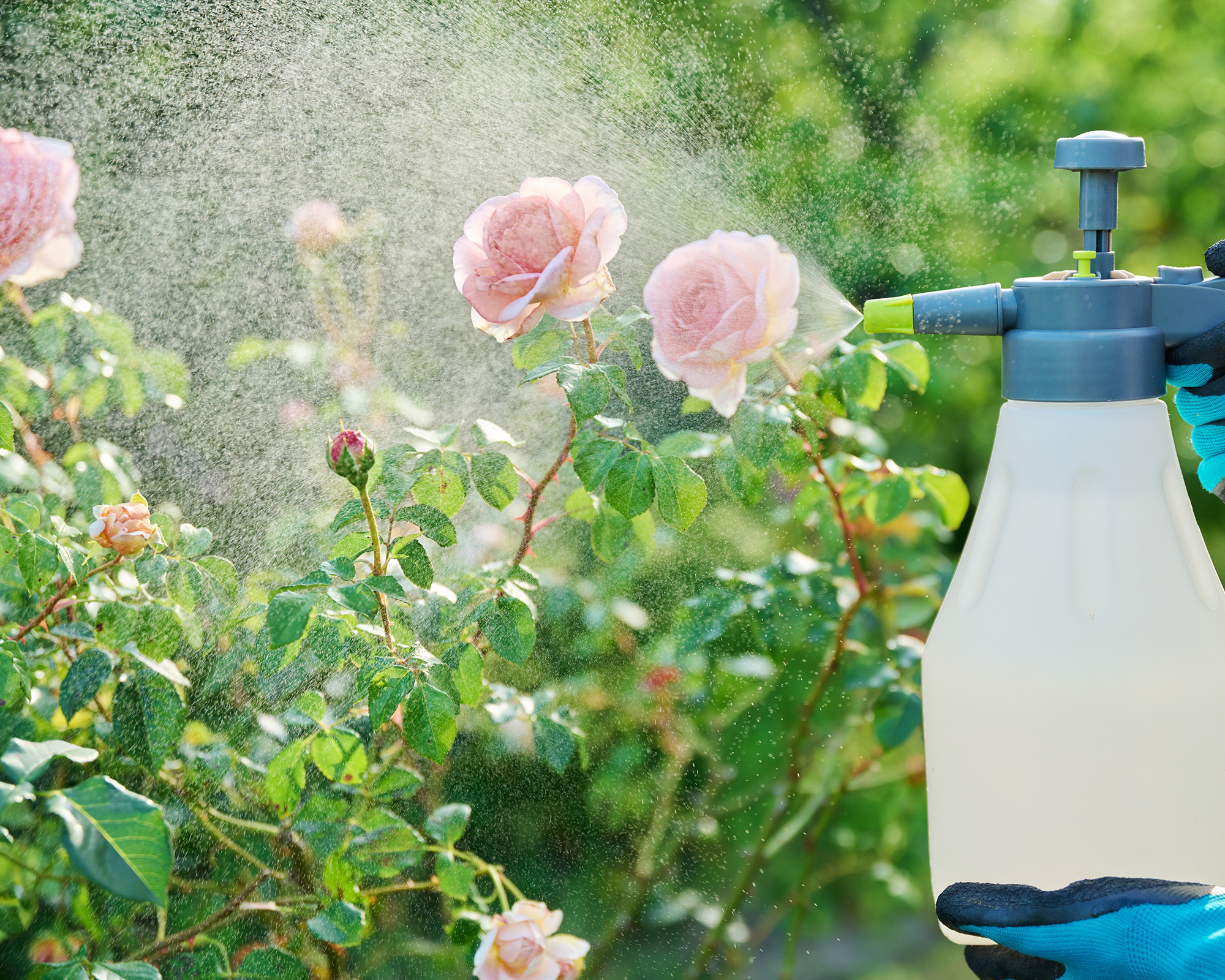
Plants to Prevent Japanese Beetles
Though learning how to keep these pests off roses may seem like a monumental task, you can stay one step ahead by choosing Japanese beetle-resistant plants that will deter or stand up to infestations:
Trap Crops and Companion Plants
Some gardeners have success planting trap crops, such as four o’clocks, or beetle-repellent herbs like catnip, chives, and garlic around their roses. These can either lure beetles away or discourage them from feeding.
Choose Resistant Roses
The selection of Japanese beetle-resistant roses is most helpful. Popular cultivars shown to demonstrate some resistance to the pest include ‘French Lace,’ ‘Joseph’s Coat,’ ‘Old Glory,’ and ‘Rainbow Sorbet’.
While no rose is completely immune, these varieties will minimize the risk of heavy infestations.
Will Soapy Water Keep Japanese Beetles Off Roses?
Not really. While dropping beetles into soapy water works as a disposal method, spraying soapy water directly on plants isn’t consistently effective. Stick with hand-picking or targeted controls instead.

Stan V. Griep contributed to Gardening Know How for many years and has been a Colorado Native Rosarian for over four decades. He is an American Rose Society Certified Consulting Master Rosarian in the Rocky Mountain District, and a member of the Denver Rose Society, the Loveland Rose Society, and the American Rose Society. He is Gardening Know How's in-house expert on all things roses.


